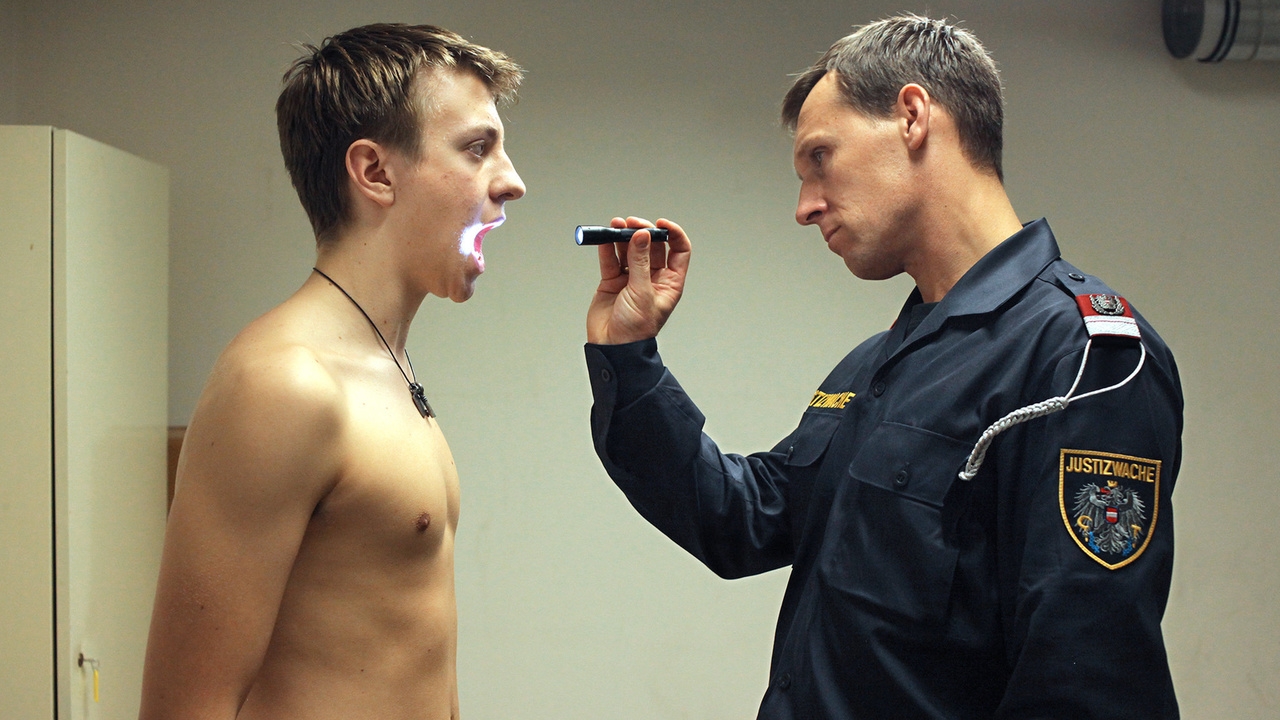By Chlotrudis Independent Film Society
Rating: 4.5 cats
Director: Karl Markovics
Starring: Georg Friedrich | Karin Lischka | Thomas Schubert

Original language title: Atmen
Country: austria
Year: 2012
Running time: 94
IMDB: http://www.imdb.com/title/tt1680679/
Bruce says: “When we first see Roman Kolger he is being taken to task because he has botched his first day on the job as a metal worker. Apparently a pattern has formed; this is not his first failure. Back at the Juvenile Detention Center, he is strip-searched. ‘Open your mouth, bend over,’ the guard screams. The odds are against this 19 year old. Orphaned, farmed out to foster parents and now a Juvenile Detention veteran, Roman has no skill sets. He truly seems incapable of working, communicating or expressing emotion. Roman is doing time for murder and his early release had been repeatedly denied.
His parole officer (Gerhard Liebmann), is dismayed that Roman has not demonstrated any ability to forge his way into society. ‘You don’t want to leave? Scared?’ he asks. Roman is uncommunicative. Next he is sent to the mortuary. The shift manager sums up his job, ‘Right corpse, right case, right time, right place.’ He is given a uniform but cannot tie his tie – he’s never worn one before. His surly co-worker refuses to help. When his team is called out on a job Roman becomes pale. Riding along in the grey panel truck it appears that Roman is being set up for failure. ‘Your first corpse?’ the manager inquires, knowing full well the answer.
The second call is to the home of a dead elderly lady. She is lying on the floor in the nude. ‘Never seen a naked lady before?’ It’s not her nakedness that shocks Roman, but her life. The apartment is filled with knickknacks, memorabilia and photographs. Roman’s eyes scour every detail. The co-worker begins to wash her gently, almost with loving care. Roman takes that in, too. Roman looks through her closet to find something suitable to dress her in. His manager notices that Roman is not wearing a tie and challenges him. ‘Forgot it,’ Roman says matter-of-factly. Had the question been posed any other time and place no doubt Roman would behave differently. But something remarkable has happened to him. With little knowledge of the outside world he is getting his first taste and it is unexpected. Through death Roman may discover how to define life.
As I watched this scene, I felt it was one of the greatest cinematic scenes I’ve ever encountered. Later, director Karl Markovics told the audience that he began writing BREATHING with this scene as a starting point. He envisioned a dead lady lying naked on the floor. He decided not to focus on the story of the dead lady but on those who handled her body. Who were they? Why would someone do this job? What if they were forced into doing this job? From that evolved the story of Roman.
The surname of the dead lady is Kolger and Roman fantasizes that she might have been his mother. That fantasy leads him to track down his birth mother (Karin Lischka). He begins to stalk her. Eventually they meet and he explains who he is. ‘Why did you give me up?’ he asks. ‘It was the best thing I’ve done in my life,’ she replies. Roman is shocked. All these events lead up to another parole hearing. Is Roman ready for life on the outside?
Thomas Schubert’s performance is truly remarkable. Although he rarely speaks he subtly conveys his thoughts, his fears, his desires with true finesse. Markovics gets tremendous performances from all his actors. He directs every scene with precision and meaning. His script imbues the characters with his sense of psychology and empathy. The film is photographed beautifully and I suspect Markovics’ strong directorial hand has much to do with that as well. Acclaimed for his starring role in the Oscar-winning THE COUNTERFEITERS, Markovics appears to fare even better as a director. In his words, he isn’t afraid of ‘showing things people don’t want to see.’ Not me, I want to see more. 5 cats
(BREATHING screened at the 2012 New Directors/New Films Festival jointly sponsored by the Film Society of Lincoln Center and the Museum
of Modern Art.)”
Diane says: “Buried Treasure nom. A young man escapes the hold his past has on him, and death–the smell of a corpse, the weight of a coffin, the grief and the prosaicness of death–is the vehicle. Camerawork augments Roman’s passage from one kind of life into another as he allows himself to know and be known. Director Karl Markovics masters the maxim of ‘show, don’t tell.’ See Bruce’s fine review for more. 4 cats”
